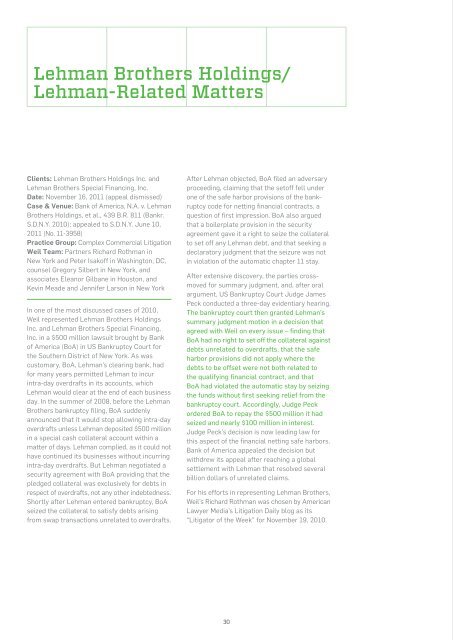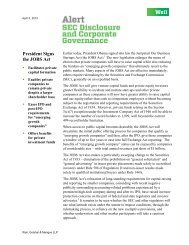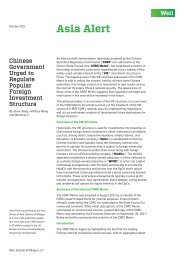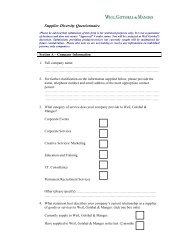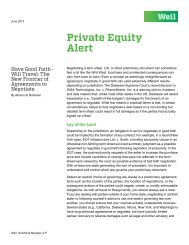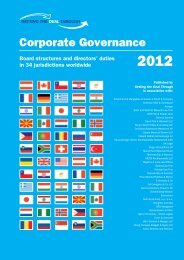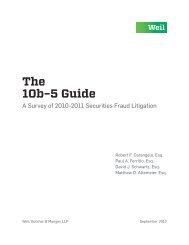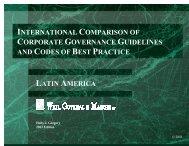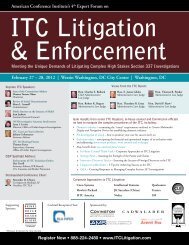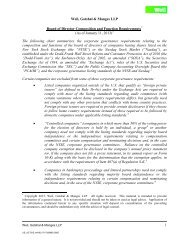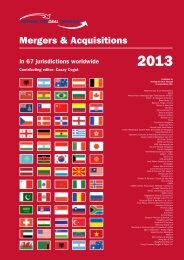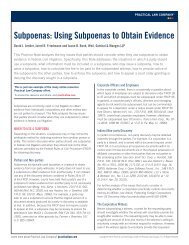Download PDF - Weil, Gotshal & Manges
Download PDF - Weil, Gotshal & Manges
Download PDF - Weil, Gotshal & Manges
Create successful ePaper yourself
Turn your PDF publications into a flip-book with our unique Google optimized e-Paper software.
Lehman Brothers Holdings/<br />
Lehman-Related Matters<br />
Ranked Band 2 for Securities<br />
Litigation – Nationwide<br />
Chambers USA 2011<br />
Clients: Lehman Brothers Holdings Inc. and<br />
Lehman Brothers Special Financing, Inc.<br />
Date: November 16, 2011 (appeal dismissed)<br />
Case & Venue: Bank of America, N.A. v. Lehman<br />
Brothers Holdings, et al., 439 B.R. 811 (Bankr.<br />
S.D.N.Y. 2010); appealed to S.D.N.Y. June 10,<br />
2011 (No. 11-3958)<br />
Practice Group: Complex Commercial Litigation<br />
<strong>Weil</strong> Team: Partners Richard Rothman in<br />
New York and Peter Isakoff in Washington, DC,<br />
counsel Gregory Silbert in New York, and<br />
associates Eleanor Gilbane in Houston, and<br />
Kevin Meade and Jennifer Larson in New York<br />
In one of the most discussed cases of 2010,<br />
<strong>Weil</strong> represented Lehman Brothers Holdings<br />
Inc. and Lehman Brothers Special Financing,<br />
Inc. in a $500 million lawsuit brought by Bank<br />
of America (BoA) in US Bankruptcy Court for<br />
the Southern District of New York. As was<br />
customary, BoA, Lehman’s clearing bank, had<br />
for many years permitted Lehman to incur<br />
intra-day overdrafts in its accounts, which<br />
Lehman would clear at the end of each business<br />
day. In the summer of 2008, before the Lehman<br />
Brothers bankruptcy filing, BoA suddenly<br />
announced that it would stop allowing intra-day<br />
overdrafts unless Lehman deposited $500 million<br />
in a special cash collateral account within a<br />
matter of days. Lehman complied, as it could not<br />
have continued its businesses without incurring<br />
intra-day overdrafts. But Lehman negotiated a<br />
security agreement with BoA providing that the<br />
pledged collateral was exclusively for debts in<br />
respect of overdrafts, not any other indebtedness.<br />
Shortly after Lehman entered bankruptcy, BoA<br />
seized the collateral to satisfy debts arising<br />
from swap transactions unrelated to overdrafts.<br />
After Lehman objected, BoA filed an adversary<br />
proceeding, claiming that the setoff fell under<br />
one of the safe harbor provisions of the bankruptcy<br />
code for netting financial contracts, a<br />
question of first impression. BoA also argued<br />
that a boilerplate provision in the security<br />
agreement gave it a right to seize the collateral<br />
to set off any Lehman debt, and that seeking a<br />
declaratory judgment that the seizure was not<br />
in violation of the automatic chapter 11 stay.<br />
After extensive discovery, the parties crossmoved<br />
for summary judgment, and, after oral<br />
argument, US Bankruptcy Court Judge James<br />
Peck conducted a three-day evidentiary hearing.<br />
The bankruptcy court then granted Lehman’s<br />
summary judgment motion in a decision that<br />
agreed with <strong>Weil</strong> on every issue – finding that<br />
BoA had no right to set off the collateral against<br />
debts unrelated to overdrafts, that the safe<br />
harbor provisions did not apply where the<br />
debts to be offset were not both related to<br />
the qualifying financial contract, and that<br />
BoA had violated the automatic stay by seizing<br />
the funds without first seeking relief from the<br />
bankruptcy court. Accordingly, Judge Peck<br />
ordered BoA to repay the $500 million it had<br />
seized and nearly $100 million in interest.<br />
Judge Peck’s decision is now leading law for<br />
this aspect of the financial netting safe harbors.<br />
Bank of America appealed the decision but<br />
withdrew its appeal after reaching a global<br />
settlement with Lehman that resolved several<br />
billion dollars of unrelated claims.<br />
For his efforts in representing Lehman Brothers,<br />
<strong>Weil</strong>’s Richard Rothman was chosen by American<br />
Lawyer Media’s Litigation Daily blog as its<br />
“Litigator of the Week” for November 19, 2010.<br />
Clients: Tishman Speyer Development Corp.<br />
and Archstone-Smith Trust<br />
Date: August 29, 2011<br />
Case & Venue: Katz, et al. v. Gerardi, et al.,<br />
No. 10-1407 (10th Cir.)<br />
Practice Groups: Appellate, Securities<br />
Litigation<br />
<strong>Weil</strong> Team: Partner Jonathan Polkes in New<br />
York, counsel Lisa Eskow in Houston, and<br />
associates Ashish Gandhi, Caroline Zalka, and<br />
Jennifer Larson in New York<br />
<strong>Weil</strong> secured a major victory for Tishman Speyer<br />
Development Corp., Archstone-Smith Operating<br />
Trust, Archstone-Smith Trust, and current and<br />
former officers and Trustees of Archstone-Smith<br />
Trust when the Tenth Circuit Court of Appeals<br />
upheld the dismissal of a securities fraud class<br />
action brought by investors in Archstone-Smith,<br />
a real estate investment trust (REIT) that affiliates<br />
of Tishman Speyer and Lehman Brothers<br />
purchased in 2007 in a $22 billion leveraged<br />
buyout (LBO). The deal was one of the largest<br />
REIT LBOs in history and closed just prior to<br />
the onset of the financial crisis.<br />
The plaintiffs brought suit in the wake of the<br />
2008 financial crisis, alleging that Tishman<br />
Speyer and certain trust executives responsible<br />
for the LBO did not appropriately disclose the<br />
deal’s associated risks. In August 2010, the US<br />
District Court for the District of Colorado<br />
dismissed the case with prejudice, finding that<br />
certain of the named plaintiffs’ securities claims<br />
should have been brought together with other<br />
causes of action alleged by the same plaintiffs<br />
in a prior action (which <strong>Weil</strong> also succeeded<br />
in getting dismissed); that certain plaintiffs’<br />
Securities Act claims were unfounded because<br />
those plaintiffs could not allege a purchase of<br />
securities; and that the plaintiffs’ Exchange Act<br />
claims failed because they could not allege that<br />
any damages were caused by the alleged false<br />
statements (i.e., failure to plead loss causation).<br />
The Tenth Circuit upheld the dismissal,<br />
confirming that the investors lacked standing<br />
to bring the case. The court ruled that the<br />
Securities Act claims brought by the plaintiffs<br />
“provide relief only for purchasers – not sellers –<br />
of securities,” and that without standing as<br />
a purchaser, the plaintiffs “lack[] standing<br />
to bring his claims under the 1933 Act.” The<br />
plaintiffs attempted to gain standing by citing<br />
the fundamental change doctrine, but the<br />
court denied such claims in multiple instances,<br />
concluding, “To say the merger made Katz<br />
[the named plaintiff] a purchaser ... is verbal<br />
alchemy unsupported by the text of the 1933<br />
Act or the case law.”<br />
30<br />
31


